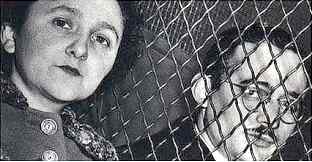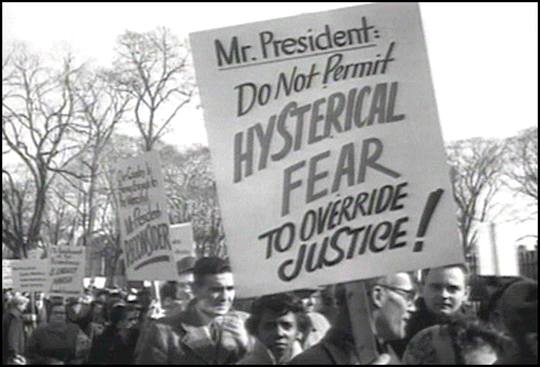To a certain extent, and only so far as we can believe the testament of former KGB agents (who would be looking to make money on the stories of their pasts) or the files of the US government (who still had a stake in the Rosenbergs' guilt), this goal was realized: In 1995, the National Security Agency released the Venona transcriptions, allegedly sent from the Soviet Consulate in New York to Moscow in 1944 and 1945. The USA Today headline, SOVIET DOCUMENTS INCRIMINATE ROSENBERGS, was typical. Meeropol let the chips fall, and in most people's eyes they seemed to stack up against his parents and their cause.
It seems to me that Meeropol's reaction to Venona is only to his credit. Yes, he questions the transcripts' authenticity and disapproves of how the experts and the media have viewed United States controlled documents as independent proof, but nevertheless he works on the assumption that they are true in order to face every possibility. And having taken this approach he states that the most Venona could show is that Julius Rosenberg supplied non-atomic, industrial secrets to the KGB -- and that Ethel, having had no contact with the Russians herself, did nothing to stop him.
 This somewhat ambiguous position - Julius was guilty of something, but not what they said, and Ethel is innocent - is a far cry from the Robert Meeropol of 1965, who saw his emotional belief in his parents' innocence become an "intellectual certainty." It is the difference between considering new evidence in order to verify one's already formed opinion and considering it openly and without prejudice.
This somewhat ambiguous position - Julius was guilty of something, but not what they said, and Ethel is innocent - is a far cry from the Robert Meeropol of 1965, who saw his emotional belief in his parents' innocence become an "intellectual certainty." It is the difference between considering new evidence in order to verify one's already formed opinion and considering it openly and without prejudice.
Contrast Meeropol's evolution with that of Ronald Radosh, one of the most prominent of those now proclaiming the Rosenbergs' guilt. His book The Rosenberg File (Yale University Press, 2nd ed. 1997) was originally supposed to prove their innocence - but Radosh's research led him to believe otherwise. Now Radosh proclaims their guilt: he moved from one certainty to another. Meeropol, in contrast, was moving towards doubt, both of his original opinions and those of everyone else. If Radosh's change was a conversion, Meeropol's was a loss of faith. At his most mature, Meeropol is a natural skeptic. His epiphany is that he must learn to live perhaps without ever knowing the truth about events which took place before he was six but which have ever since played a massive, even defining, role in his life.
 But for someone like Meeropol, compelled by character to political activism just as someone else might be creative or athletic, such agnosticism can constitute a problem. If he's not sure of the truth, how can he campaign claiming they were treated unfairly? The difficulty is illustrated in An Execution when he relates the time he asked Marshall Perlin, the lawyer who had been in charge of their litigation against the government, to hold a press conference to preempt the possibility that Julius Rosenbergs had helped supply the Soviet Union with non-atomic information. Meeropol wanted to embrace the uncertainty ahead of any potential revelation, but Perlin thought it was a "terrible idea" and told Meeropol "we should not concede anything unless we absolutely had to." (205). Perlin's advice was born of an understanding that the world of political activism involves picking sides, keeping messages simple and remaining loyal.
But for someone like Meeropol, compelled by character to political activism just as someone else might be creative or athletic, such agnosticism can constitute a problem. If he's not sure of the truth, how can he campaign claiming they were treated unfairly? The difficulty is illustrated in An Execution when he relates the time he asked Marshall Perlin, the lawyer who had been in charge of their litigation against the government, to hold a press conference to preempt the possibility that Julius Rosenbergs had helped supply the Soviet Union with non-atomic information. Meeropol wanted to embrace the uncertainty ahead of any potential revelation, but Perlin thought it was a "terrible idea" and told Meeropol "we should not concede anything unless we absolutely had to." (205). Perlin's advice was born of an understanding that the world of political activism involves picking sides, keeping messages simple and remaining loyal.
Surely, then, given his agnosticism, Robert Meeropol would be safe to steer away from his parents' case and choose a cause of which he can be more certain? On one level that is exactly what he has done. Since the 1990s his two main areas of campaigning have been against the death penalty and, through his own Rosenberg Fund for Children (RFC), to provide for the needs of children of targeted progressive activists in the United States. But it doesn't take much to realize how closely these are related to issues raised by the execution of the Rosenbergs. What is important is that they do not depend on the details of the case. The work against capital punishment is in fact based on the positive assertion of agnosticism. Meeropol puts it in simple terms:
| Humans are imperfect beings. We make mistakes. Sooner or later all the safeguards in a human-built system will fail. It is unrealistic, therefore, to expect a mistake-proof justice system. A large majority of people will readily agree that capital punishment allows no room for error. It is, therefore, inevitable that mistakes will be made and innocent people will be executed. (234) |
Activism still requires strong belief, but here it is the belief in the fallibility of all belief.



Harvard Death Fugue
On the Exploitation of Bruno Schulz
James Russell
The Jews of Istanbul
Sara Liss
The Truth about the Rosenbergs
Joel Stanley
Thinking despite Doubt, Feeling despite Truth
Jay Michaelson
Two Rituals
Joshua Bolton
Hepster Advice
Jennifer Blowdryer
Josh Goes to the Hospital
Josh Ring
Archive
Our 400 Back Pages
Saddies
David Stromberg
Zeek in Print
Winter 03 issue now on sale
About Zeek
Events
Contact Us
Links
From previous issues:
The Mall Balloon-Man Moment of the Spirit
Dan Friedman
The Other Rally
Samuel Hayim Brody
The Gifts of the German Jews
Michael Shurkin